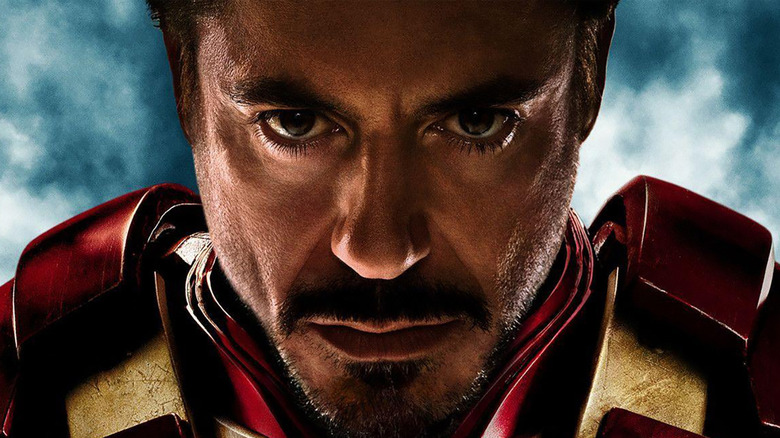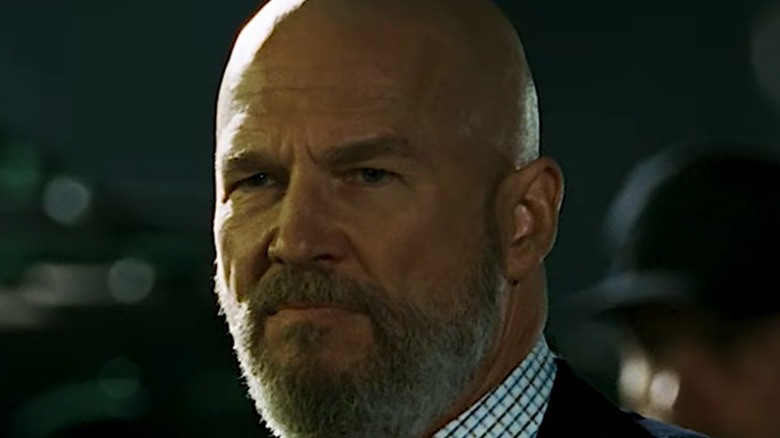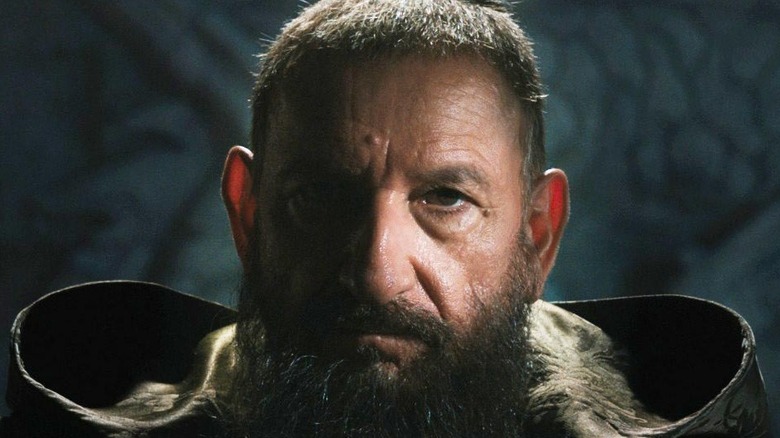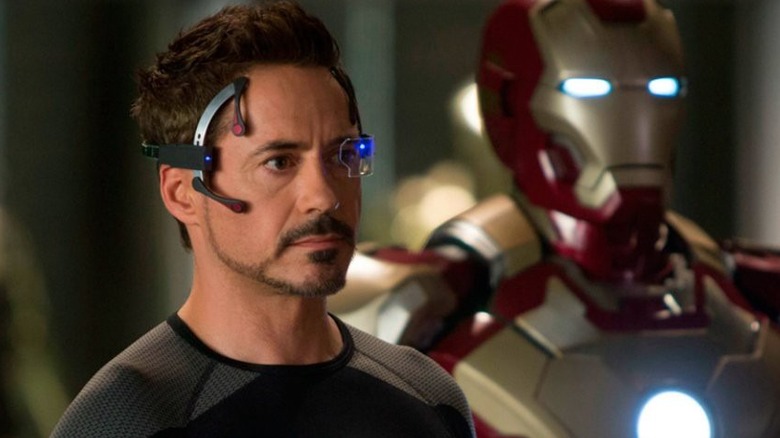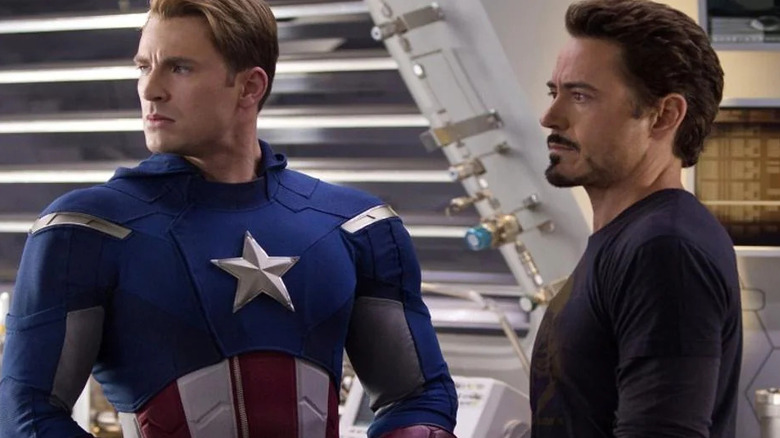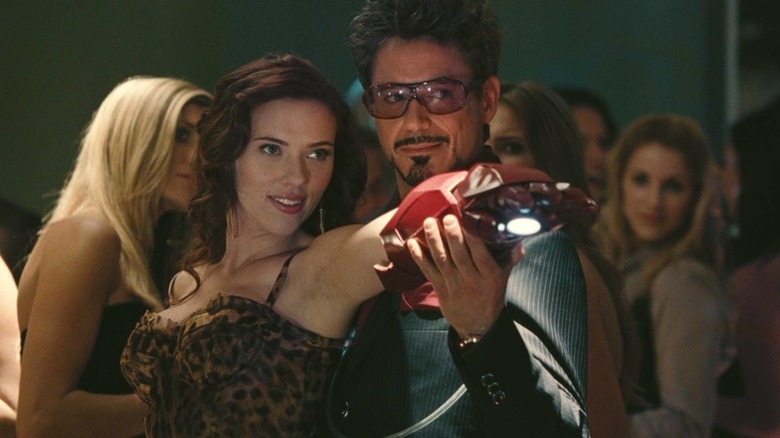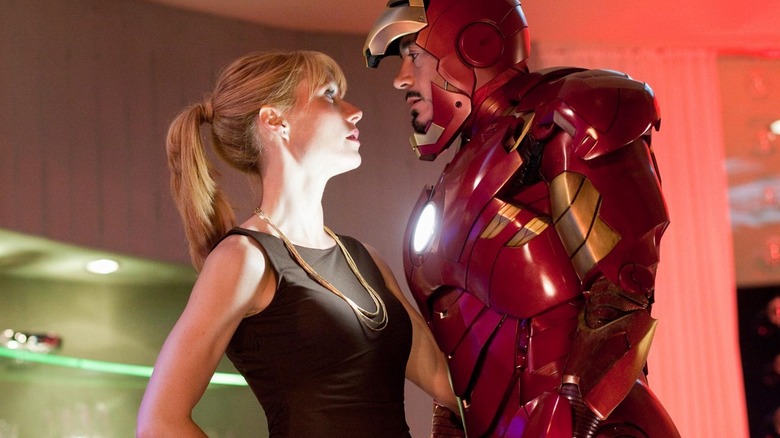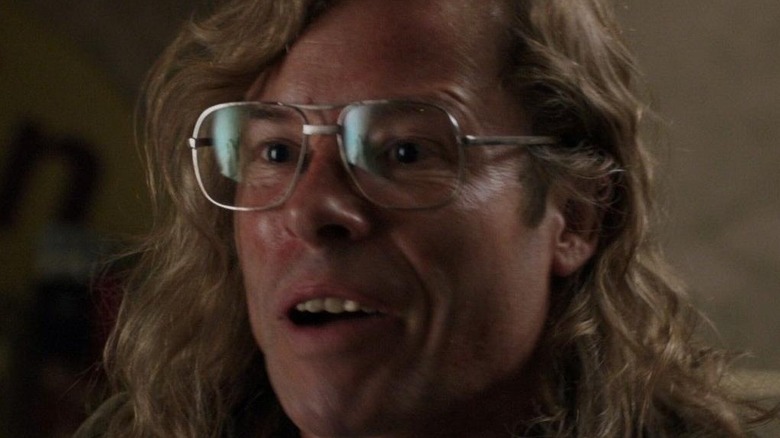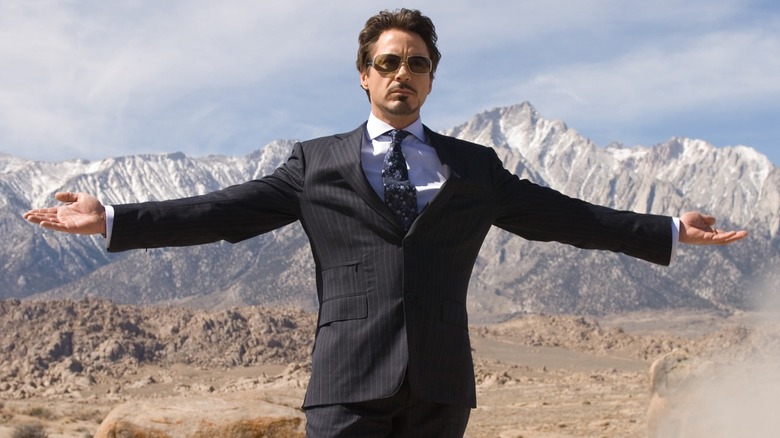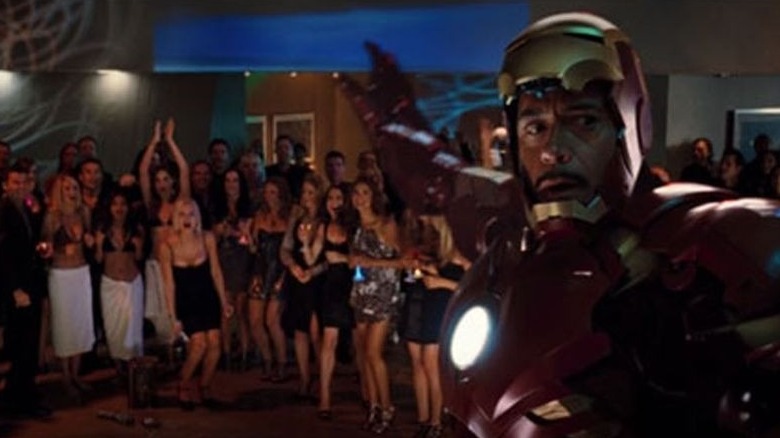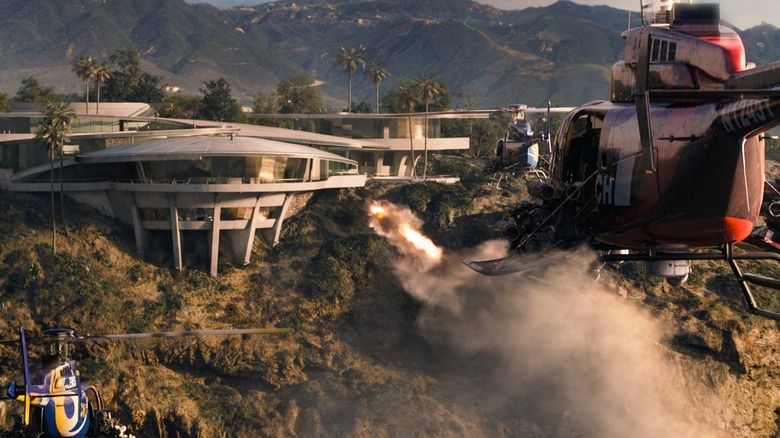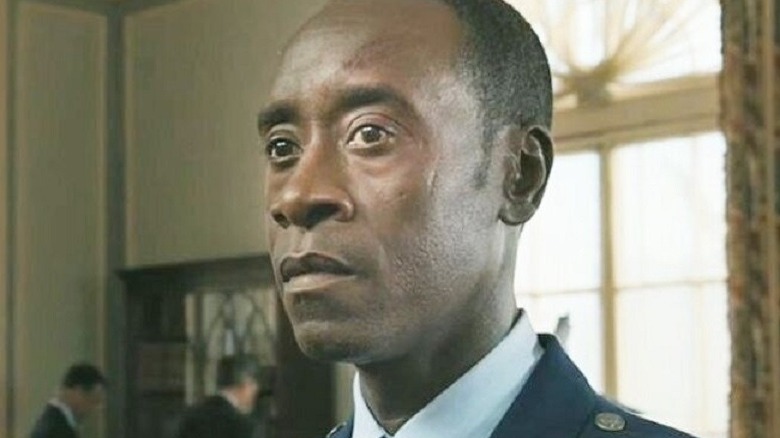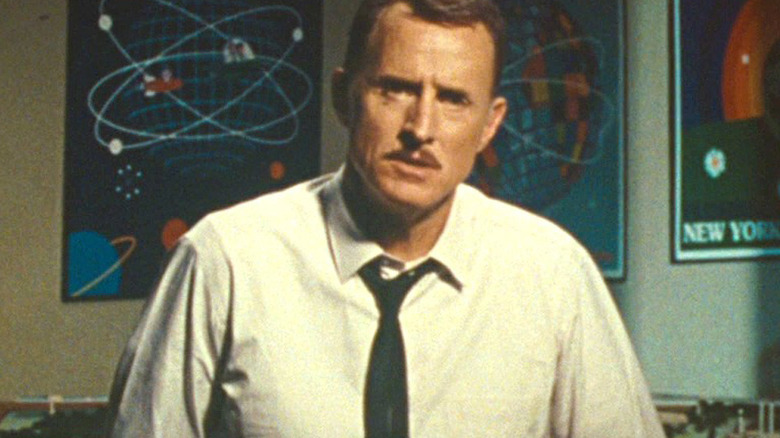Questionable Things We Ignore In The Iron Man Movies
It's difficult to say which film ranks most popular in the MCU, but it's easy to argue that the three "Iron Man" movies are among the most popular series. Having grossed a combined $2 billion at the box office, each entry in the "Iron Man" trilogy has been considered a financial success, kickstarting the MCU, laying the foundation for The Avengers, and cementing the light-hearted comedy/inter-personal drama blueprint that has defined the most popular universe of films at the box office today.
Still, not every "Iron Man" move has been flawlessly executed. A number of viewers have found a a few questionable aspects sprinkled throughout the trilogy, some having grown more problematic as time has passed. Below is a list of the ill-advised, the poorly-received, the head-scratchers and the "huh?" moments — the questionable things we tend to overlook about the "Iron Man" trilogy, simply because we love the character so darn much.
Tony killed his father-figure
Before the events of 2008's "Iron Man," Tony Stark grew up an orphan, his parents seemingly killed in a mysterious car accident (later revealed to have been caused by brainwashed Hydra agent Bucky Barnes). Without a strong parental figure to raise him, Tony formed a close bond with his father's business partner, Obadiah Stane (Jeff Bridges) — a friendly mentor/mentee relationship illustrated throughout most of the first film.
But in the third act of "Iron Man," it was revealed that Stane was the man behind Tony's capture in Afghanistan — putting out a hit on Stark in order to capture control of the company. After Stane tried stealing Tony's arc reactor for himself, Tony and Stane battled during the film's climax, with Stane electrocuted to death by Tony and Pepper.
Given the precarious position he was in, Tony killing Stane can certainly be viewed as an act of self defense. Nevertheless, if most of us killed the man who raised and mentored us, it would likely bring about a grief that would require a lengthy period of mourning; it would be a life-defining tragedy. Stark killed the closest thing he had to a father-figure for most of his adult life, and has barely mentioned it since the first film.
No one recognized the Mandarin's true identity
Aldrich Killian may be the main villain of "Iron Man 3," but the "antagonist" fans tend to remember seeing is an early take on the Mandarin. While it would be wrong to shame Marvel for swinging for the fences with a high-concept bait-and-switch masterminded by frequent Downey collaborator Shane Black, in the eyes of some, it was a swing and a miss.
An infamous villain in the pages of Iron Man and Shang Chi comics and Sax Rohmer's World War I-era "Dr Fu Manchu" novels, potential ticket-buyers were teased with a modern version of the Mandarin, played by Oscar winner Sir Ben Kingsley. But when they showed up in huge numbers to watch the actual film, writer/director Black revealed a Mandarin who was a figurehead — an out-of-work British actor named Trevor Slattery, hired to make propaganda terrorist videos that would distract from the illegal operations of real-villain Aldrich Killian (Guy Pearce).
For many, the casting of Kingsley furthered an unfortunate whitewashing tradition of the Mandarin character; the fact that he wasn't even the villain just felt like adding insult to injury. From a logical point of view, it seems crazy to think that no one would've recognized Slattery or uncovered his true identity in an age of facial recognition scans, with both Stark and the US government able to identify the world's most wanted terrorist as an old actor (he even appeared in an '80s pilot and claims to have worked with Sean Connery). So, just to be clear, Tony Stark is sharp enough to figure out time travel — but he never realized his enemy was a hired Hollywood D-lister.
The movies make light of Tony's bullying
Tony Stark was known in the Marvel movies for his quick quips and witty dialogue. Whether he was insulting alien warlords by calling them Squidward or mocking members of a Congressional hearing in front on national television, Tony's biting sarcasm was a defining trait.
While most people remember the more light-hearted side of Tony's sense of humor, fans tend to forget the mean-spirited stuff. Perhaps the clearest example of this came during the opening moments of "Iron Man 3," when Tony coldly rebuked and mocked Aldrich Killian — at the time a frail, fledgling scientist and devoted fan of Stark's work. If Tony's sarcastic comments weren't enough, he also promised to meet with Killian on top of their hotel roof, with no actual intention of ever showing up. After waiting over an hour for Tony to show up, Killian confessed to feeling so horrible that he briefly considered jumping off the roof and ending his own life.
Tony's roguish sense of humor may have provided the MCU with some of its funniest moments, but rarely do fans think about just how hurtful Tony's comments could be. While a case can be made that Tony's callous remarks were a mixture of narcissism and self-defense (after the death of his parents, he clearly wasn't eager to open his heart to people), the MCU movies have been eager to embrace the jokes, but not always so willing to follow up on how deeply some of Tony's words cut.
Nobody interfered during the events of Iron Man 3
Taking place after the first "Avengers" film, "Iron Man 3" saw Stark up against arguably his greatest adversaries yet in the Mandarin and then Aldrich Killian.
A brilliant antagonist with ties to Tony's past, Killian was perhaps the most legitimate threats in the three "Iron Man" movies, destroying Tony's mansion (and nearly killing him in the process), kidnapping and subjecting Pepper to genetic experiments, and abducting the President of the United States. With such high-profile crimes, you'd think one of Tony's new friends would lend some Avengers assistance to aid Tony or interfere with Killian's plans?
Yet, "Iron Man 3" is the only "Iron Man" film without an appearance from Nick Fury or any agents of S.H.I.E.L.D. Looking back now, it seems extremely unlikely that an American intelligence agency dedicated to national security wouldn't appear in some capacity, either investigating the Mandarin or attempting to rescue the President.
Killian's crimes were undoubtedly a nationwide news story, and viewers saw Tony recount the entire events of the film to Bruce Banner in the movie's post-credit scene. So, it's worth wondering what Banner was doing during the events of "Iron Man 3" instead of coming to the rescue when Tony's house was being bombed or when Air Force One was being attacked by Killian's men.
Tony's playboy attitude
True to the comics, Tony Stark was introduced as a charming billionaire playboy. Charismatic, handsome, and outgoing, he was able to charm multiple women with his intelligence, quick wit, and stylish wardrobe choices. Tony's status as a "ladies' man" would gradually fade with each new MCU film (especially after Disney acquired Marvel Studios), but can be most clearly glimpsed in the first two "Iron Man" movies.
In 2008's "Iron Man," Tony was frequently seen flirting with numerous women, sometimes accompanying several women at once. Near the start of the film, he granted a female reporter a quick interview because "she's cute" (after a hostile interview where Tony remained openly flirtatious, they slept together). Later on, Tony flirted with several female flight attendants aboard his private jet. In the next scene, those same flight attendants danced provocatively in front of Tony and Rhodey, with a dance pole set up in the middle of the flight cabin — again illustrating Tony's playboy status. In "Iron Man 2," Tony was smitten by the appearance of Natasha Romanoff — then masquerading as his new assistant — and tried flirting with her before he realized she was an agent of S.H.I.E.L.D.
As Tony grew more committed in his relationship with Pepper Potts, his flirtatious behavior with other women died down, but it's still interesting to see a time in the MCU when Tony closely resembled the womanizing party animal he was presented as in the original comics.
Tony's problematic relationship with Pepper
While on the subject of Tony's romantic side, his relationship with Pepper had its ups and downs. Introduced as the loyal, trusty, and endlessly efficient assistant, Pepper brought a strong, hard-working ethic to Stark Industries — a stern, professional girl Friday to bring scheduling and focus to Tony's unprofessional work ethics. She was also portrayed as a budding love interest of Tony's, although it seemed she was more committed to maintaining a platonic relationship than engaging in a romantic one.
Over the three "Iron Man" movies, Pepper's relationship with Tony evolved; by "Iron Man 3," they had become an official couple. However, as with all couples, they were not without occasional difficulties.
Tony frequently lied to Pepper regarding sensitive information (such as the fact that he was dying in "Iron Man 2"), and appeared to lack basic knowledge about Pepper's personal life, such as her birthday or that she was allergic to strawberries. In the third movie, their relationship was put to the test with the introduction of Killian, a potential romantic rival to Tony vying for Pepper's affections. At one point in the film, Tony even sent Happy Hogan to spy on Pepper and Killian as they had drinks, showing that — despite how much they loved each other — the couple had problems every now and again that threatened their relationship.
Tony made his own villains
Iron Man remains a unique hero in the MCU for a variety of reasons. Most notably, he is one of the few Marvel characters responsible for creating his own villains, either as an indirect result of his personality, or as a consequence for the Stark family's role in the weapons manufacturing industry.
In the first "Iron Man," the terrorist group known as the Ten Rings (we'd learn much more about them later in "Shang-Chi") wreaked havoc in the Middle East by using various devastating weapons produced by Stark Industries. That film's main antagonist, Obadiah Stane — tired of Tony's immaturity and lack of professionalism — tried to kill Stark and seize control of the arc reactor and the company for himself. In "Iron Man 2," the two main villains are similarly spurred by Tony's achievements in creating his Iron Man suit. Without access to Stark's technology and because of Tony's frequent snide remarks, Justin Hammer (Sam Rockwell) desperately turns to unstable criminal Ivan Vanko (Mickey Rourke) to develop his own version of the Iron Man suits to better compete with Tony's success.
It is "Iron Man 3," however, that features the best example of Tony creating his own villain. Aldrich Killian was once a young, aspiring scientist who looked up to Tony, telling Tony how much his support would mean for the sake of his company. After being mocked and ridiculed by Tony, Killian developed plans for revenge, determined to one day prove Tony wrong.
Tony was a war profiteer
It isn't too many movies that could get you to root for a guy who makes his living selling arms to anyone and everyone who can meet his price, but the MCU pulls it off.
When most people think of Tony Stark, the word "hero" comes to mind (especially after his last selfless act defeating Thanos in "Avengers: Endgame"), but when people think of war profiteers, the connotation is quite different. With how heroic Tony would become by the time "Endgame" was released, it's easy to forget his appearances in the first "Iron Man" movie depicted him as being a war profiteer.
Gaining control of Stark Industries after his father's death in the early 1990s, Tony inherited Howard Stark's role as a powerful weapons manufacturer in the first half of "Iron Man" — his main client being the US military. Designing powerful weapons for deployment in the Middle East, Tony was portrayed as seemingly indifferent to his role in the military industrial complex, earning him the nickname the "Merchant of Death."
In a brief interview with a female reporter, Tony quoted his father's words to justify his involvement in weapons production, saying, "My old man had a philosophy: 'Peace means having a bigger stick than the other guy.'" Only after his capture (and subsequent escape) did Tony realize the negative effect his weapons had on the world, accepting accountability for his actions and shutting down the weapons manufacturing division of Stark Industries as a result.
Tony's irresponsible use of his suit
Tony liked to party in the first "Iron Man" movies, and when he was buzzed, rather than a lampshade or a toga, he wasn't afraid to slip into the Iron Man suit.
Before his captivity in the original "Iron Man," he was shown drinking, flirting with women, and engaging in leisurely activities like gambling rather than tending to business matters related to Stark Industries. When he returned to the US after his imprisonment, he was a changed man, someone whose experiences and first-hand exposure to war had matured him. Nevertheless, it would be a long time before Tony became the \ sober, mature character we saw in the final MCU films.
Evidence of this can be found most clearly in "Iron Man 2," where Tony appeared to be using his suit for his personal convenience (such as picking up donuts) or to impress others. At one point, he even jokes about urinating in the suit. He hosts a party in his superhero garb, drinking heavily and showing the suit's vast capabilities to partygoers.
So basically, Tony Stark was drinking heavily while in a fully weaponized, mechanical suit, using his chest plate's repulsor blast to blow up watermelons. This was extremely dangerous, putting dozens of peoples' lives on the line for the sake of some laughs. Thankfully, Tony used his suits more responsibly in later moments, but his initial carelessness and irresponsibility demonstrate just how reckless he could be at times in the early "Iron Man" movies.
Tony constantly underestimated his enemies
Tony's confidence has always been a defining characteristics — for better, and for worse.
It's what gave the character such an edge and helped set him apart from his serious-minded counterparts like Rhodey, Nick Fury and Captain America. However, Tony's overconfidence has nearly killed him on multiple occasions.
In perhaps the best example, Tony goaded the Mandarin into attacking him, challenging him in front of a group of reporters while calling him a "coward" and giving out his home address on TV. Not the smartest move.
Knowing the Mandarin to be a dangerous criminal who wouldn't take such insolence lightly, you'd think Tony would have at least prepared his home defenses for an attack of some kind. Nope. Either he believed the Mandarin was bluffing, or Tony was too overly confident in his ability to defend himself. Whatever the explanation might be, Tony's near-death at the Mandarin's hands illustrated his tendency to make his own worst enemy ... himself.
Tony didn't fully trust his best friend
The main conflict of the first two "Iron Man" movies was Tony's reluctance to share his toys.
In the first film, he denied his close friend and business partner, Obadiah Stane, a chance to look at his arc reactor. In the second film, he refused to allow the government access to his suits, knowing they intended to use them for military purposes. During the events of "Iron Man 2," Tony comes close to having a falling out with his old friend Rhodey (Don Cheadle, replacing Terrence Howard) as a result of Tony's reluctance to share his technology, triggering an argument that escalates to a physical altercation.
Since Rhodey is an officer in the US military, it's perhaps not too surprising that Tony felt conflicted allowing him to wear his suits. It's also likely Tony remembered when Stane tried exploiting their relationship to gain access to the suit, and is simply remaining cautious about who has access to his inventions. In the end, Rhodey literally had to fight Tony to wear the suit, leading him to becoming the fan-favorite MCU superhero War Machine.
Though Rhodey's intentions were always noble, Tony's distrust got the better of him, threatening their years-long friendship in the process. Even by the end of the film, Tony still displayed some slight misgivings about Rhodey taking a suit for himself, although he gradually accepted Rhodey's hero status in subsequent MCU films.
Tony's questionable relationship with his father
Tony's dynamic with his dad is an essential story arc, not only in the "Iron Man' stories, but in many ways the greater MCU as well. In the early Marvel films, however, it was a relationship that wasn't fully explored, treated more as a minor plot thread explaining Tony's initially cynical worldview, carefree lifestyle (casual drinking and womanizing), and his involvement in the weapons manufacturing industry.
While Howard Stark became a more important character in later MCU films (and went from Gerald Sanders to John Slattery and a flashback-friendly Dominic Cooper), his earliest appearances in the "Iron Man" movie hint at a father-son relationship characterized primarily by emotional neglect and perhaps even abuse. Growing up, Tony felt he and his mother always came second to Howard, who prioritized his company over his own family.
As revealed in "Iron Man 2," Howard only spent so much time working to ensure his company was strong enough for Tony to inherit, rather than leaving his son with no viable financial options to live off of. Although his intentions may have been sincere, Howard's initial depiction in the Marvel Universe was a checkered one, as shown by the complicated impact his death had on Tony. The two would finally come to terms with one another in "Avengers: Endgame," but the pain and torment Tony felt over his father's neglect was made quite clear in all three "Iron Man" movies.
